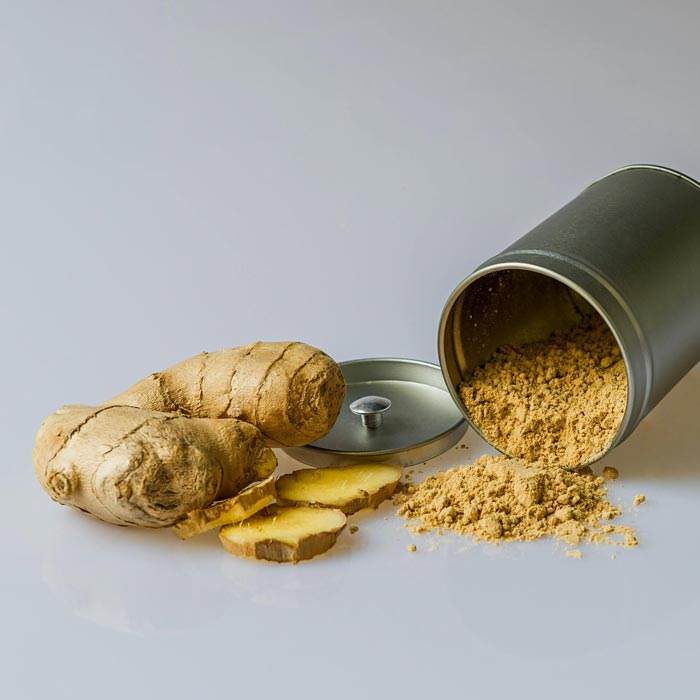Health Benefits of Ginger
The rhizome of ginger root is a perennial flowering herb that has medicinal and therapeutic benefits. It is closely related to other aromatic herbs like cardamom, turmeric and galangal.
The good news is that science has confirmed what traditional medicine has known for thousands of year – plants such as ginger can improve a variety of ailments and conditions, and improve your overall health.
Takeaways:
- Ginger root, which is related to turmeric, contains gingerols (a bioactive compound) and shogaols (a bioactive compound), both of which are beneficial for health.
- Ginger can reduce nausea and vomiting among a wide range of people.
- Ginger can improve symptoms such as dyspepsia, gastroparesis and delayed gastric emptying.
- Ginger can be used to relieve pain from migraines, musculoskeletal problems and other pains.
- Ginger is known to reduce inflammation, and it’s especially beneficial for osteoarthritis sufferers.
- Ginger is known to reduce the risk of diabetes and metabolic syndrome by improving biomarkers for metabolic function.
1. Ginger May Reduce Nausea
Gingerols, and shogaols are the primary bioactive substances in ginger. Ginger is used to treat digestive and inflammatory ailments. It’s also commonly used for nausea, indigestion and slow motility.
In controlled, randomised trials, ginger at 1.0-2.0g per day reduced nausea and vomiting and improved gastric function compared to placebo. The use of 0.5-2.0g daily was effective in reducing nausea and vomiting caused by chemotherapy.
These findings are supported by many other studies. A meta-analysis found that ginger was safe and effective for pregnancy induced nausea and vomiting. This population is advised to take less than 1500mg of ginger extract per day.
2. Ginger May Improve Gastric Motility
The process of gastric motility occurs when the stomach pulses in rhythmic waves, from the top to the bottom. This helps to mix the food with the acid and transport it to the small intestine. Gastric motility, also known as delayed emptying of the stomach or gastroparesis can cause bloating, nausea and pain as food is not properly emptied.
Ginger is a natural remedy that can help to improve gastric emptying as well as gastric contractions. This is a function that’s compromised by those who have hypomotility, gastroparesis and delayed gastric empting.
Other studies confirm the same findings. 1.2g of ginger extract, given before a single meal , accelerated gastric emptying faster than a placebo in dyspepsia patients.
3. Ginger May Reduce Pain
Numerous studies have examined how ginger may help to relieve pain of various origins.
In one study, ginger was found to be effective in reducing pain in the chest and lower back after angioplasty.
A second study showed that 400mg of ginger extract combined with ketoprofen (a non-steroidal pain reliever) improved symptoms and function in a migraine attack when compared to a placebo plus ketoprofen.
4. Ginger May Reduce Inflammation
Inflammation can be a factor in chronic diseases, including those causing chronic pain and discomfort such as osteoarthritis.
Six randomized controlled trials found that ginger at a dose of 500mg a day reduced symptoms of OA, due to lower levels of pro-inflammatory cytokines.
After supplementation, ginger intervention trials show that other biomarkers of inflammation such as creactive protein (CRP), and antioxidant levels improve.
5. Ginger Improves Markers of Metabolic Disorder
The metabolic syndrome or dysfunction is characterized as high triglycerides and high blood pressure. It also includes insulin resistance, abdominal obesity, and high fasting glucose. Disease progression is less likely when biomarkers can be better controlled.
Five controlled, randomized trials examined ginger’s effects on metabolic function. Improvements were found in many biomarkers, metabolic assessments including insulin resistance and HOMA-IR.
How to Use Ginger Effectively?
Ginger comes in many forms: whole root, powder, tea, chews and extracts. There is no superior form of ginger if the concentration is the same. Select the form you are most comfortable with and can be consistent in.
For relief, drink ginger tea several times per day (2 grams per serving) or take 0.4-2.0 grams of ginger root (400-2000mg/day). Some brands of ginger gums also contain 2.0g of ginger for those who tolerate sugar.
Resources
- NIH. Ginger on Human Health: A Comprehensive Systematic Review of 109 Randomized Controlled Trials.
- SAGE Journals. Double-blind placebo-controlled randomized clinical trial of ginger (Zingiber officinale Rosc.) addition in migraine acute treatment.
- BMC. A systematic review and meta-analysis of the effect and safety of ginger in the treatment of pregnancy-associated nausea and vomiting.







